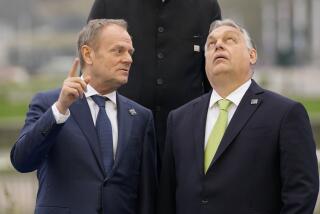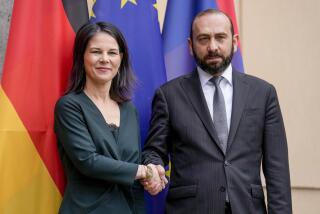Genscher Ends Poland Trip, Hails Gains
- Share via
BONN — West German Foreign Minister Hans-Dietrich Genscher concluded a four-day visit to Poland on Wednesday, underscoring what is being called the “new dynamism” of Bonn’s relations with the Communist nations of Eastern Europe.
Before heading back to Bonn, Genscher met for two and a half hours with Gen. Wojciech Jaruzelski, the Polish leader, and told reporters afterward that “never have conditions (for East-West relations) been so favorable as they are today.”
He suggested that Chancellor Helmut Kohl will go to Poland before the year is out, and he said this would “represent a breakthrough in Polish-West German relations.”
The two governments agreed, Genscher said, to set up working groups that will undertake to resolve differences on security questions, financial and economic issues and proposed treaties on scientific, cultural and consular affairs.
The West Germany policy of strengthening bridges to the East Bloc countries is being closely watched by Western diplomats, who tend to have mixed feelings about it.
“The West Germans have a pragmatic foreign policy,” one Western diplomat commented. “They see that there is much to be gained by strengthening their relations with the Eastern European countries.”
“For us,” an official of the West German Foreign Ministry said, “this is the only way to go. We don’t see any alternative to our ostpolitik (policy in the East). But our allies should not be worried. We think that the more connections there are between us and the Communist Bloc, the less everyone has to fear from misunderstanding, miscalculation and mistrust.”
On the heels of Genscher’s visit to Poland, Chancellor Kohl plans to travel to Czechoslovakia later in the month. And, on Sunday, Soviet Foreign Minister Eduard A. Shevardnadze is to arrive in Bonn to discuss a scheduled visit by Soviet leader Mikhail S. Gorbachev.
To Stress Improvement
Shevardnadze will be the highest-ranking Soviet official to visit West Germany in five years. Many observers here think his presence is intended to emphasize the sharp improvement in Bonn-Moscow relations.
The conservative daily Frankfurter Allgemeine published a long article Wednesday under the headline “The New Dynamism.” It said that Bonn “is giving new impetus to relations with the East” and that Kohl’s office “has the impression that Moscow no longer has any reservations about further developing relations with Bonn.”
West German politicians of virtually every stripe are making an effort to improve relations with the countries to the east, a course charted by Social Democratic Chancellor Willy Brandt in the late 1960s. The reasons are clear.
West Germany, situated on the East-West frontier, wants a stable relationship with the Warsaw Pact powers. This would mean a reduction in tension and would be welcomed by almost everyone in West Germany. And the West German economy would benefit by increased trade with East Germany, Czechoslovakia, Poland, Hungary, Romania, and Bulgaria.
There is also the fact that, historically, Germany played a leading role in Central Europe until it was shorn of power and influence with the defeat of Nazi Germany in World War II.
Another consideration is that good relations with the Communist countries would help improve the lot of the hundreds of thousands of ethnic Germans living in East Europe. Many of these people have lived in East Europe for generations and have been assimilated, but many others suddenly found themselves in a foreign country when boundaries were redrawn after World War II.
Improved ties with the Soviet Union already have borne fruit in this respect. About 12,500 ethnic Germans arrived in West Germany from the Soviet Union last year, contrasted with only 753 the previous year.
More to Read
Sign up for Essential California
The most important California stories and recommendations in your inbox every morning.
You may occasionally receive promotional content from the Los Angeles Times.













